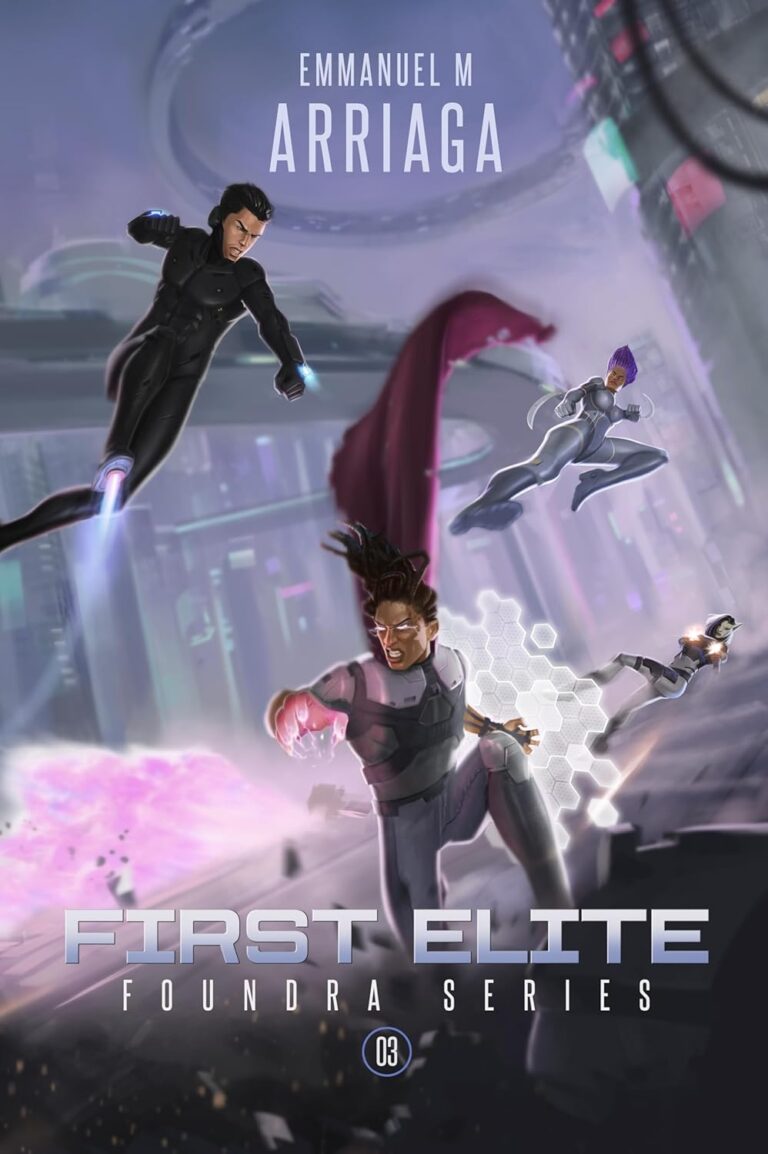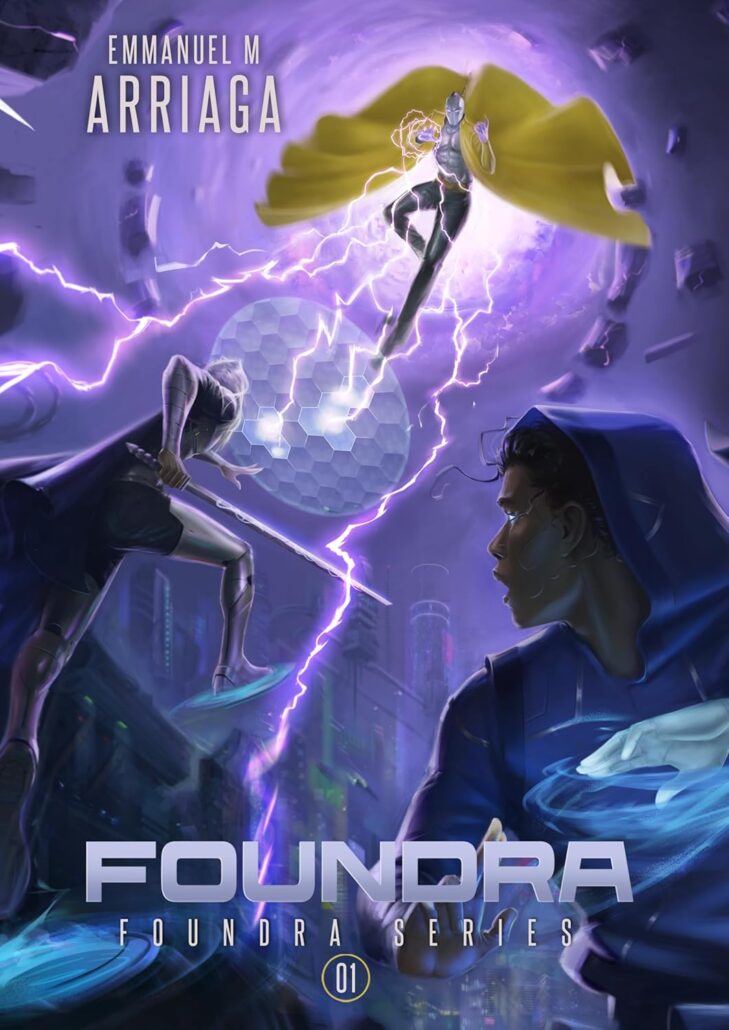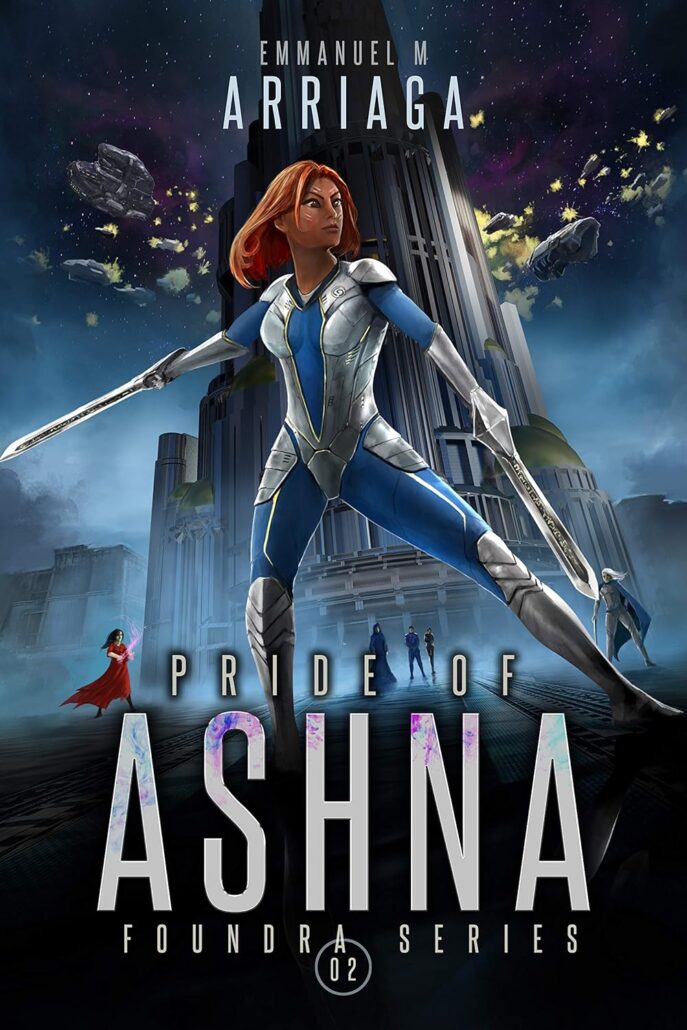
Following find an interview with author Emmanuel Arriaga.
What is the name of the book and when was it published?
First Elite, February 4, 2025
What’s the book’s first line?
The steady, monotone beeping of the heart monitor blared across the medical deck.
What’s the book about? Give us the “pitch”.
First Elite is a genre-bending sci-fi epic that blends the gritty realism of hard science fiction with the mythic power of epic fantasy.
When Zun Shan—renowned scientist, tech billionaire, and newlywed—is murdered by Entradis, the most feared enemy of the Huzien Empire, her husband, Neven Kenk, becomes consumed by grief. Once a brilliant inventor with a heart for peace, Neven is now driven by rage and a thirst for vengeance. But vengeance has a price.
As Neven builds new weapons of war and hurtles toward self-destruction, those around him begin to fracture. His AI companion, Ellipse, awakens to terrifying new abilities, evolving beyond anything ever imagined. Tashanira, a warrior of legend, finds herself trapped between duty and her heart. And as Entradis grows more dangerous, the Founder’s Elites—an elite strike force sworn to protect the empire—must confront the possibility that their greatest threat may not be a monster from without but the empire they have pledged their lives to.
Set in a richly imagined universe of immortal rulers, synthetic intelligences, and cosmic forces that bend the rules of reality, First Elite is a sweeping, emotional, and action-packed journey about love, power, and what it means to be truly alive.
What inspired you to write the book? A particular person? An event?
First Elite is the culmination of the first narrative arc within the Foundra Universe—a journey that began years ago in Foundra, Book 1. At its heart, this novel grapples with one of humanity’s most profound and unsettling questions:
“Why do bad things happen to good people?”
This question is deeply personal to me. Growing up in poverty, enduring significant hardships, and experiencing the immense pain of my firstborn son’s serious health struggles, I’ve lived this question intimately. I was bitter when I was young, and this severely affected my mental health and caused me to sabotage myself in some areas and relationships. But over time, through the transformative power of education and the cathartic experience of writing, I found peace and a purpose.
First Elite embodies this journey of understanding. It’s a narrative born from real pain, resilience, and the pursuit of meaning. The characters are meant to reflect real-world struggles—facing tragedy, wrestling with loss, and seeking answers that seem forever out of reach. Yet through their stories, I offer readers the insights that have helped me heal, grow, and find my place in this universe.
My greatest hope is that First Elite will not only entertain readers but also offer solace and inspiration to anyone who has ever looked at the stars and asked, “Why me?” Hopefully, readers will find the courage to embrace their own stories, transform their pain into strength and their challenges into triumphs, and ultimately discover their unique purpose in this universe.
What’s the main reason someone should really read this book?
People should read First Elite because it’s more than just a thrilling blend of science fiction and fantasy. It explores what it means to be human in a universe filled with wonder and tragedy. At its core, First Elite invites readers on an emotional journey that challenges them to confront powerful questions about loss, purpose, love, and resilience.
First Elite is meant to inspire and provoke deep reflection. By experiencing the struggles and triumphs of characters who wrestle with the hardest aspects of life—grief, identity, and finding meaning amid chaos—readers who have struggled with these challenges will hopefully see reflections of their journeys in the different characters throughout the story.
Ultimately, First Elite is for anyone who’s ever asked profound questions about their own life and sought answers that could bring peace, understanding, and a renewed sense of purpose. While I can’t guarantee that this book will give you those answers, I hope it will at least provide a different perspective that can help in that search.
What’s the most distinctive thing about the main character? Who-real or fictional-would you say the character reminds you of?
Neven is distinctive because he is not the archetypal hero who chooses the right path easily. Instead, he is deeply conflicted. He struggles, stumbles, and even falls into darkness, yet he never loses the capacity for redemption. Neven is profoundly relatable because his journey mirrors our experiences of navigating pain, anger, love, and ultimately, finding peace.
If I had to compare Neven to another character, he’s reminiscent of Tony Stark (Iron Man). Like Tony, Neven is a brilliant inventor burdened by trauma and grief, driven by both personal demons and a sense of responsibility to the world. Both characters use technology as a shield against vulnerability and pain, yet they also discover their greatest strength in vulnerability, growth, and self-sacrifice. Like Tony Stark, Neven isn’t memorable just because he’s powerful—he’s memorable because he’s deeply, imperfectly human.
When did you first decide to become an author?
I was on a school bus in my senior year of high school when I decided to tell my friend about this fantastic sci-fi universe I had been dreaming of since I was little. I told him all about the immortal people who ruled over this galactic empire, its history, and the early lore of what would become the Foundra Universe.
I regaled him with stories of the adventures of this sword-wielding immortal leader and his squad of elites until I was exhausted. He and the other kids around me were enthralled. That was the first seed, that early spark that told me people wanted to listen to my stories and that I should share my imagination with the world. It wouldn’t be until many years later, after I had graduated college and started working full time, that I had the time to sit down and start writing.
It took me five years to organize my thoughts and write the first story, Foundra. My excellent English and creative writing teachers in high school were big inspirations. I applied the skills I learned in my creative writing class, exploring world-building and crafting lore in a way that became incredibly therapeutic.
Is this the first book you’ve written?
This is my fourth book, and the third book in the Foundra series. I’ve written three science fiction novels (Foundra, Pride of Ashna, and First Elite) and one LitRPG novel (Elevator Quest).
What do you do for work when you’re not writing?
I’m a Product Manager at Google, where I manage the AI models and enforcement infrastructure for developer risk mitigation in the Google Play Store. In layman’s terms, I stop bad developers from spreading harmful apps that could get onto your Android phone and ruin your day.
How much time do you generally spend on your writing?
I try to write every day. I think it’s important as an author to build this habit, even if it’s the bare minimum and you can’t spend hours doing it. Just sitting down and doing some form of writing helps keep the skills sharp and allows you to grow as a writer. It’s also a form of therapy for me, so it’s vital that I do it daily to de-stress and recuperate.
What’s the best and the hardest part of being an indie?
The best part of being an indie author is that you have complete creative freedom around the creation of your novel, and you work on timelines that make sense for you and your life. The hardest part is building an audience. One of the major benefits of being traditionally published is the marketing power that comes with the big publishers. It’s much easier for a good book to get recognized and seen if they put their full marketing engine behind it. This is why it’s so important to tell people about a good book you’ve read when you encounter one, especially from an indie author. It will often have far more effect than if the author spends thousands of dollars promoting and advertising their book.
What’s a great piece of advice that you can share with fellow indie authors?
The more books you write, the more successful you will be. Many new authors think that the one book they are starting with will take off and change their life. The reality is that it’s not a lottery ticket; you need to build a brand and put out a series of great books to move the dial on changing your life and becoming a full-time author. Also, start building your email list early to nurture your audience.
Would you go traditional if a publisher came calling? If so, why?
I’d be open to working with a traditional publisher, but it would have to make financial sense—not just to have a traditional publisher behind my name. I think people can easily be lured by the prospect of being picked up by a traditional publisher and getting that $5k advance, but they end up worse off than they would have been as indie authors, and they may not move the volume to cover their advance. That’s a terrible situation because publishers will quickly lose interest in a book that isn’t moving volume early on, and you’re very limited in your options at that point.
Given the lower royalties, you could spend a lot of money on marketing with a much smaller return. I remember reading that the smart thing to do when you get picked up by a traditional publisher is to take the advance they give you and invest it in your PR campaign, which runs parallel with the publisher’s efforts.
This distinction is because moving volume is more of a slow burn for self-published authors. It’s less likely that you’ll have these big bang releases that move hundreds of thousands of copies in week one. More practically, it will slowly build up as you grow your email list and get better at targeted advertising.
Is there something in particular that motivates you (fame? fortune?)
It’s not about fame or fortune; it’s about sharing my imagination with the world. I love to see other people get excited when they talk about my books. I get a lot of joy when people ask me questions about the narrative or how certain characters responded in specific situations. I’m driven by that engagement and the love I see people have for the stores I tell. It’s less about me and more about the work. When people talk with excitement about a story arc I spent a lot of time working on. I remember that moment of shock or sorrow when I hear them talk about a specific scene that pulled at their heartstrings or a twist that caught them off guard. That motivates me to keep writing and to put in the long hours crafting these stories.
Which writer, living or dead, do you most admire?
I admire RA Salvatore. He’s a phenomenal author, and he has been a significant influence on my writing. I love how he gets into his characters’ heads, specifically Drizzt. You get emotionally invested in his characters and care about them, their decisions, and their mistakes. He’s good at bringing his characters to life, and I try to emulate that in my writing, to make the people feel real. He’s also been a mentor to me over the years. I’ve engaged with him on social media and have gotten advice on my writing and the challenges I’ve faced as an author. He’s given me words of wisdom that have helped me in my journey.
Which book do you wish you could have written?
I’m a big fan of Greek mythology, of the stories of gods and goddesses interacting with mortals and the chaos they bring as they meddle in the lives of ordinary people to make them extraordinary. Along those lines, I’m a big fan of the story behind the Odyssey. I think so much more could have been done with that story: building that narrative and truly bringing the characters alive. I would love to have written that book as the author I am today and brought it to life through my writing style.



